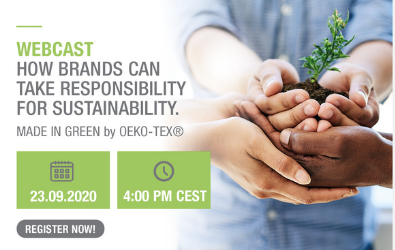Europe is way ahead of the U.S. in terms of corporate sustainability, particularly when it comes to fashion. Not only are European companies more advanced if you consider the number of brands that focus on sustainability, but they are moving quickly to become even more sustainable each year, especially when compared with their U.S counterparts.
Take, for example, the OEKO-TEX® and MADE IN GREEN by OEKO-TEX® labels. European consumers know to look for the labels on their clothing and home goods, like linens and towels, if they want to be sure the clothes they wear or the sheets they sleep on do not have harmful levels of chemicals and are manufactured in facilities that care for workers and minimalize the environmental impact of processes like dying.
While some American brands have been certified and carry the OEKO-TEX® label, few share that fact with their consumers or use it as part of their brand story. Why? Because consumer awareness, and thus demand, is lacking here in the States, so companies don’t see the benefit.
Some companies fear that because they are not yet 100% sustainable, they should not educate consumers about the ways in which they are working toward increased transparency and traceability. This is counterproductive. Sustainability is a process, a moving target, something that gets better with time and effort. What was considered sustainable five years ago is different from today and will be different again in another five years. There is no perfection.
Luckily, the global tide is changing. According to Google, over 90 days in the first half of 2020, the number of people searching the phrase “how to live a sustainable lifestyle” increased by more than 4,550 percent. And in 2019, the number of companies that went through the OEKO-TEX® certification process increased by 13 percent.
The intersection of the global health pandemic and the climate crisis that is playing out through fire season in the West and hurricane season in the South East has brought the connection of planetary and human health to the forefront of our consciousness. The shoe and textile industry is responsible for 10% of global greenhouse gas emissions, which is more than air and sea transport combined. Covid-19 has increased the digitization of the textile industry, putting it on a fast track for positive change. Textile sustainability, supply chain traceability and manufacturing transparency, which are quickly becoming a mandate in the EU, need to gain critical traction here at home.
Please join Teak President Jackie Russell, who will host the OEKO-TEX® webinar, “How Brands Can Take Responsibility for Sustainability” on Wednesday, September 23, 2020 at 10:00 am ET. Register for free here: https://register.gotowebinar.com/register/7645831645430507021
Participants will hear from sustainability experts and manufacturers who are putting great efforts in creating sustainable and fashionable brands including:
- Andreas Bothe, Head of CSR & Sustainability Management for Chiemsee, Bay City Textihandels GmbH
- Thimo Schwenzfeier, Show Director Neonyt, Messe Frankfurt
- Michael Möller, Division Audits & Certification, Hohenstein
- Annika Sauerhöfer, Product Manager MADE IN GREEN, OEKO-TEX®


